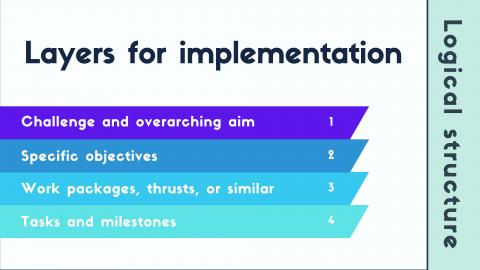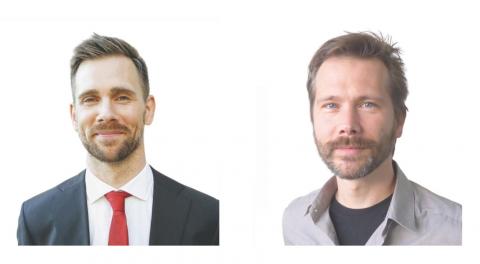ERC Advanced Grant webinar for the SOMMa community
On July 3, 2020, the SOMMa community held a webinar in connection to one of the most notorious European research funding schemes: the ERC Advanced Grants. The event is aimed at helping SOMMa members to secure funds for research projects from especially competitive funding programs such as this one. Over 80 researchers and research support staff from 34 SOMMa members attended. The participants represented a wide range of disciplines, ranging from economics to engineering, supercomputing, math, materials science, life and health sciences, agronomics, astro- and particle physics, chemistry and environmental sciences.
The webinar, organised with the logistic support of the Centre for Genomic Regulation (CRG) Training Department, treated numerous aspects relevant for the successful application of an ERC Advanced Grant (AdG). The content covered aspects related to the ERC aim, context and evaluation criterion, but also put an emphasis on sharing best practices on how to prepare a competitive proposal. During and at the end of the event, participants were given time to ask questions.

The webinar was presented by consultants Malte Beringer and Stewe Bekk. Asking them about the ERC calls, they affirm that “the beauty of the ERC grants is the exclusive focus on scientific excellence, reflected in the famously “open” template with almost no predefined structures. This gives every applicant the possibility to develop her or his own story, to make the application unique. But it can also be difficult to coherently present a project without any guidance. Maintaining a personal touch is part of the basis for any successful ERC application. Over the years, we have realised that there is no single way to present a convincing ERC project. Still, there are some ingredients that every project should contain.”
The participants – comprising both applying senior researchers and project managers involved in the review of proposals – expressed very high satisfaction with the organization and content of the webinar. From the side of project managers, Germán Infante of IMDEA Materials, pointed out that “while reviewing a proposal, I would check one by one the subjects treated in the webinar, which has been of tremendous help to adequately focus the text”. From the Basque Centre for Applied Mathematics (BCAM Bilbao), Miguel Ángel Benitez stressed that the webinar had been indeed really beneficial, also suggesting that SOMMa should hold more similar community events, on other relevant subjects such as, for instance, Horizon Europe.

For his part, researcher Vicente Andrés, Director of Basic Research and Full Professor at the Spanish National Centre for Cardiovascular Research (CNIC) said that “attending a webinar such as this one will certainly help in preparing strong applications, which may be necessary more than ever in a context of decreased budget allocation for Horizon Europe. We thank the speakers, the CRG and SOMMa for organizing this very useful webinar!”
Two alumni of SOMMa institutions
The presenters of the webinar have tight professional links with several SOMMa members. Before starting their individual careers as independent consultants, Stewe worked at the Catalan Institute of Nanoscience and Nanotechnology (ICN2) and at the Institute of Photonic Sciences (ICFO), helping researchers prepare grant applications, whereas Malte is a biochemist and alumni of the Centre for Genomic Regulation.
“Being a freelancer and a scientist is somewhat unusual, as most scientists follow either the “academic position” or “industry position” career paths”, says Malte, who continues, “we scientists, based on our working attitude and resilience, are well prepared to become freelancers in a science-related business.”

Regarding his current job as a consultant, Stewe says: “Having worked in both pre-award and post-award positions, I feel I have a very complete picture of the grant application process. Helping researchers apply for projects feels very rewarding to me, and the review and editing process strikes a chord with my creative side”.
“Grant preparation is hard work at many levels, and the tough competition to attain funding converts any grant application into an important task per se”, continues Malte. “Therefore, our first step is to enter into an open conversation with the applicant. What kind of support does she or he need exactly? Where can our input most likely make a difference? The support often starts with an assessment of the project goals: Does the proposed project fit with the aim of the funder? Are the criteria of the funding program clearly addressed in the proposal?”
The presenters mention that, even if this might sound surprising, the large majority of the work on the proposals is independent of the scientific field. The main added valuee, they stress, is to bring in an external perspective from someone who has the experience to have worked on many proposals.

Malte continues, “working as a grant consultant is also a service to the scientific community: National funding in Spain is unacceptably low. The most rewarding moments happen when, with our support, major funding -often from European sources – allows the scientist to conduct her or his brilliant work, at the same time giving younger group members a professional perspective.
They continue by indicating that proposals addressing fundamental scientific challenges with brilliant ideas, often from scientists that might not have the most standard excellent CV, still have chances to receive funding in an ERC, in particular for StG and CoG. For these funding schemes, they say, everyone eligible to develop a valuable proposal should be encouraged.
Stewe adds, “this year we have taken on almost 20 individual projects so far, mainly for the ERC 2020 AdG call and many with multiple rounds of review. We have also produced several webinars on how to prepare a competitive ERC AdG proposal, where the biggest one, held for the SOMMa network, attracted over 80 participants representing 34 different institutes across Spain. Considering that we had initially not planned to hold webinars, I think it is a good example of what can happen when you meet the right people, adapt to changing scenarios (i.e. COVID-19) and keep an open mind”.
Image credits:
“Layers for implementation” slide and pictures of Malte and Stewe kindly provided by themselves.
Pictures of text review and writing process are in the public domain and were obtained from Pxhere.
